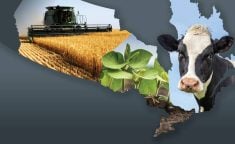The word “pleased” comes up often in reactions to Agriculture Minister Marie-Claude Bibeau’s Dec. 16, 2021 mandate letter from Prime Minister Trudeau.
The 1,921-word document instructs Bibeau to meet agricultural industry challenges, work on reconciliation with First Nations people and maintain constructive relationships with opposition MPs and journalists.
“Canadians expect us to work hard, speak truthfully and be committed to advancing their interests and aspirations,” Trudeau’s mandate letter states. “When we make mistakes — as we all will — Canadians expect us to acknowledge them, and most importantly, to learn from them.”
Read Also

Students push for Manitoba road upgrades
Manitoba’s lack of higher-rated RTAC roads creates irritating highway detours and weight restrictions for farmers, University of Manitoba students told KAP.
Trudeau’s mandate letter sets out the following priorities for Bibeau:
- Fix chronic farm and food-processing labour shortages.
- Support efficiency and climate resiliency in the agriculture and the food sector to strengthen food security.
- Significantly cut agriculture’s environmental footprint.
- Work with provinces, territories and farmers to support the sustainable growth of Canadian agriculture and food making it a global leader in the sector.
- Strengthen Canada’s food system, with an emphasis on developing a National School Food Policy and to work toward a national school nutritious meal program.
Why it matters: The prime minister’s mandate letter establishes the federal government’s priorities for agriculture and food in Canada. The public can try to influence the outcome and measure Bibeau’s progress.
Trudeau wants Bibeau to deliver these commitments:
- Work with the provinces and territories to update business risk management programs, including to integrate climate risk management, environmental practices and climate readiness.
- Ensure farmers, including Indigenous, young and women farmers, have the opportunity to contribute.
- Support farmers to adopt practices to cut pollution, store carbon in healthy soil and enhance resiliency.
- Triple funding for clean tech on farms, including for renewable energy, precision agriculture and energy efficiency.
- Work with farmers and stakeholders to reduce methane and fertilizer emissions.
- Support the minister of employment, workforce development and disability inclusion to implement sector-based work permits and strengthen the inspection regime to ensure the health and safety of temporary foreign workers.
- With the support of other ministers expand paths to Permanent Residence for international students and temporary foreign workers through the Express Entry system.
- Work to prevent African swine fever entering Canada, including a cost-shared response plan.
- Protect supply management and provide fair compensation to supply-managed farmers in wake of the Canada-United States-Mexico Agreement.
- Work with provincial and territorial governments to develop the next agricultural policy framework, ensuring climate action and resilience are core.
- Create a No-Waste Food Fund to help the food supply chain eliminate, reduce or repurpose food waste.
- Work with other ministers to secure supply chains.
- Support farmers who use alternative pest management approaches reducing chemical pesticides.
- Continue to explore modernizing the Canada Grain Act to meet sector needs.
- Support other ministers to establish a Canada Water Agency and implement a strengthened Freshwater Action Plan.
- Invest in the Experimental Lakes Area in northern Ontario to support international freshwater science and research.
- Ban the live export of horses for slaughter.
Keystone Agricultural Producers’ (KAP) general manager Brenna Mahoney says the general farm organization looks forward to working with the federal government.
“KAP is pleased to see the minister’s commitment to priorities like BRMs (business risk management), labour and climate action,” Mahoney wrote in an email. “We are also pleased to see the direct mention of ASF (African swine fever).”
But KAP is concerned about the reducing fertilizer and chemical pesticides.
“These decisions must be science based.”
There’s lots to like in the mandate letter, National Farmers Union president Katie Ward said in an interview.
“Our overall reaction is that we are very pleased to see that it has a lot of emphasis on accelerating climate action on farms that are going to result in emissions reductions,” she said. “There are a lot of positive actions mandated in here. The call to protect the supply-managed sector and the need to address the labour crisis on farms is absolutely critical. One thing I was really pleased to see was including an update to the BRM programs to integrate climate risk management, and also ensuring that consultations gather input from youth and women and Indigenous farmers because the face of farming is changing slowly but surely.”
The NFU wants the Canada Grain Act to maintain its mandate to work in the interest of farmers, Ward added.
The NFU is also pleased Bibeau will work to improve supply chains. That should include looking at declining infrastructure including local abattoirs.
The NFU is also excited by the prospect of creating a National School Nutritious Meal program.
“We want that to help kids in Canadian schools because it’s a long time in coming,” she said. “In partnership with the daycare funding program it could make a really big difference to Canadian families.”
The Canadian Federation of Agriculture (CFA) says Bibeau’s mandate letter covers a lot of short- and long-term issues in agriculture.
“On the topic of climate change, we saw they are seeking to integrate climate risks and readiness into business risk management programs,” the CFA said in an email. “Together with increased support for farmers to adopt sustainable best management practices, this shows a willingness to work with and support farmers to realize agriculture’s potential as a natural climate solutions provider.”
CFA is pleased farm labour is a priority and that government wants to help foreign workers become citizens.
It also supports modernizing the grain act and establishing a Canada Water Agency and implementing a strengthened Freshwater Action Plan.
“Of course, it will be the processes that lead to the completion of these goals which will be the most important step, and CFA will work closely with the government to ensure that farmers’ voices are heard on all these topic.”
The government’s commitment to solving farm labour issues is “good news,” says the Canadian Agricultural Human Resource Council (CAHRC).
“Our industry is ready to support the ministers in achieving their goals and we look forward to working with them in the near future,” CAHRC acting executive director Jennifer Wright wrote in an email.
The government’s commitment to regenerative agriculture and water quality is supported and welcomed by the Manitoba Forage and Grasslands Association (MFGA) and Manitoba Association of Watersheds (MAW), respectively.
“MFGA believes the absolute key ingredient toward all healthy and sustainable ag land is provided by producers via the land they farm and the way these producers choose to farm their land,” MFGA executive director Duncan Morrison wrote in an email. “To have such a high-profile placement within the prime minister’s mandate letter to Minister Bibeau bodes well for the next agricultural framework for many of the producers in our Manitoba and Prairie region networks.”
“We encourage the federal government to utilize integrated watershed management planning as a tool in the development of the Freshwater Action Plan and look forward to engaging in the process,” MAW chair Garry Wasylowski wrote in an email.
— With files from Alexis Stockford and Geralyn Wichers
















